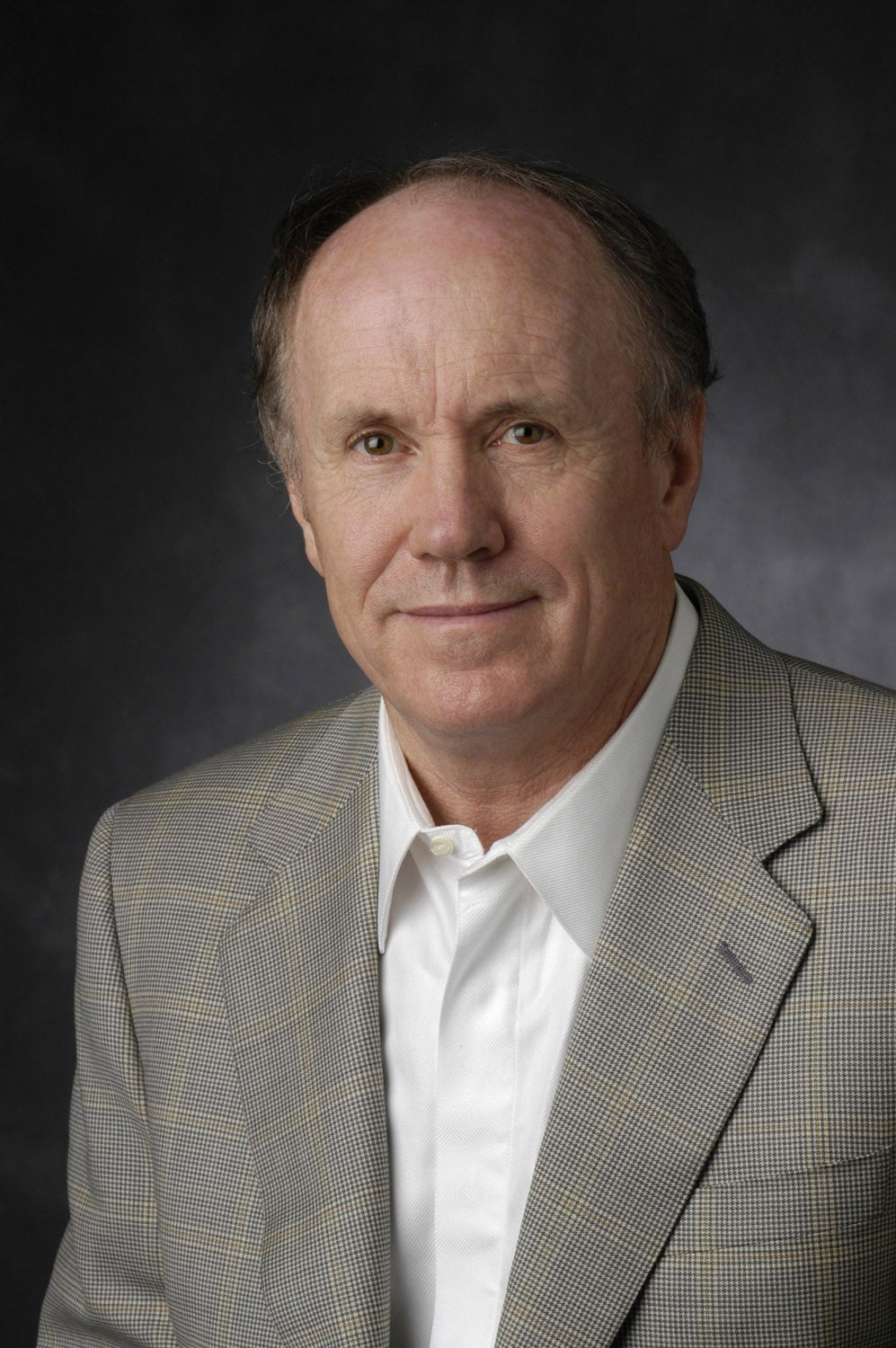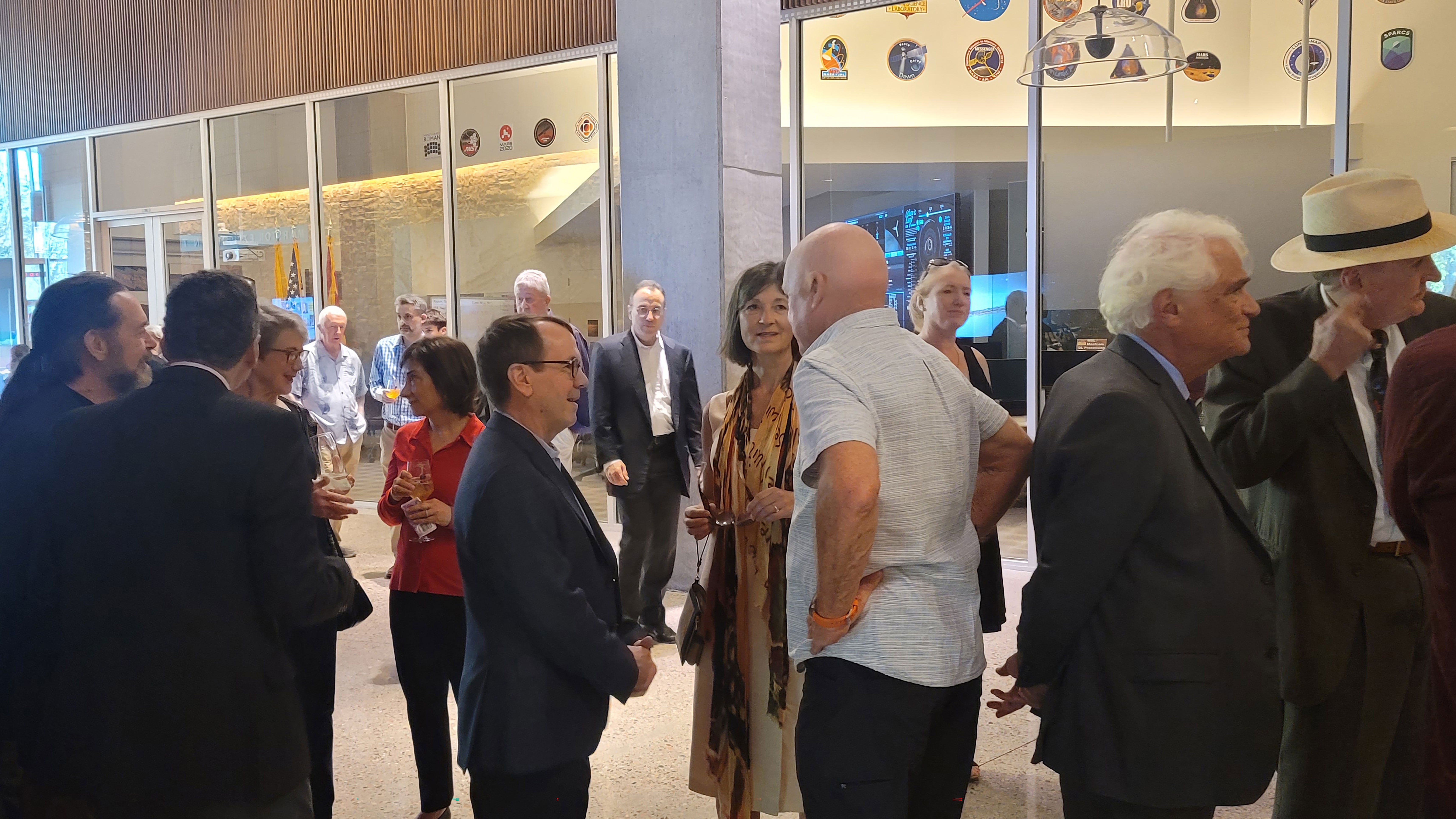In 2003, Arizona State University decided to add another economist to the faculty of the W. P. Carey School of Business.
Edward Prescott
But not just any economist. They wanted Edward C. Prescott, a leading economist.
“We knew him well — everyone knew about him,” said Arthur Blakemore, emeritus professor, who was chair of ASU’s economics department at the time. “He was quite famous.”
A few faculty members flew to the University of Minnesota, where Prescott was teaching. They joked about hiring someone with the potential to win the Nobel Prize.
Prescott was hired in three minutes. One year later, in 2004, he was awarded the Nobel Memorial Prize in Economic Sciences.
Prescott remained at ASU for 20 years, making countless contributions to his students, his department and the entire university. He died of complications related to cancer on Nov. 6, 2022. Prescott was 81.
A memorial for the man — described as a giant in the field of macroeconomics — took place Nov. 4 at the Marston Exploration Theater on ASU's Tempe campus.
“He revolutionized the way the government worked and the way the government made policies,” said Ohad Kadan, Charles J. Robel Dean of the W. P. Carey School of Business. “He not only changed the profession, but he changed the world — and he changed it for the better.”
Prescott, together with Norwegian economist Finn Kydland, received the 2004 Nobel Prize for contributions to two areas of dynamic macroeconomics: the time consistency of economic policy and the driving forces behind business cycles (boom and bust fluctuations).
Prescott also made valuable contributions to finance, economic theory and political economy.
His research transformed macroeconomics and economic theory in the late 1960s and 1970s. Beyond his academic contributions, Prescott was the senior advisor at the Federal Reserve Bank of Minneapolis since 1981.
Despite his stature in academia, “Prescott was just a regular guy who wanted to be a part of the department,” said Kadan, who is also a professor of finance. “His presence in the department, his work in the department and his congeniality in the department, made it so much better.”
Kadan was one of more than 125 people who gathered — some from as far as Brazil and Sweden — to praise and pay their respects to a beloved professor, colleague, family member and friend.
Speaking via video, ASU President Michael Crow said the university benefited greatly from Prescott’s contributions and that he will surely be missed.
“Ed was a man of massive intellect, few words and uncompromising focus,” he said.
Prescott came to ASU when the university was beginning its evolutionary trajectory to its present status as an institution committed to egalitarian access and, at the same time, with a faculty that is as excellent as the faculty anywhere, Crow explained.
“Ed manifested that by taking his students here and bringing them to the highest level. He helped evolve ASU into a world-class university,” Crow said.
Appreciating Prescott
The memorial was filled with love and laughter.
Prescott was called a guardian, a promoter and a coach, who enjoyed going out for a beer. He was described as caring, intense and competitive. Everyone acknowledged Prescott’s genius and were amused by how it sometimes surfaced in social situations.
ASU economics Professor Rajnish Mehra said he and Prescott were friends for years and went out several times a week.
He told a humorous story about how Mehra met Prescott at Carnegie Mellon University, when he was a student and Prescott was his professor. The first time they met, they were in the middle of a five-minute conversation when Prescott got up and left. Mehra waited a while and then he too left the room.
Two weeks later, the same thing happened but this time, Mehra decided to follow him. Prescott began to walk faster and then Mehra walked faster. Prescott started running and then sprinting and Mehra did the same. They ended up in the cafeteria, where both men purchased lunch. Prescott sat down at a table and Mehra joined him.
“The conversation started up again like it had never ended,” Mehra said.
Aloisio Araujo, a Brazilian economist who attended the memorial, considered Prescott a mentor.
He remembered how he would knock on his office door every morning and ask, “Did you have a breakthrough last night?”
“He was very inspiring,” Araujo said.
Attendees mingle at a memorial for ASU Professor and Nobel Prize winner Ed Prescott on Nov. 2. Photo by Richard Laborin/ASU
Prescott’s path
Prescott was born on Dec. 26, 1940, in Glens Falls, New York. He earned his bachelor’s degree from Swarthmore College and his master’s degree from Case Western Reserve University. He completed his PhD in economics at Carnegie Mellon University in 1967.
The economist was a Regents Professor at the W. P. Carey School of Business and served as the director of Center for the Advanced Study in Economic Efficiency starting in 2009.
Prior to coming to ASU, Prescott taught at University of Pennsylvania, Carnegie Mellon, the University of Chicago and more. He was also a visiting professor at Northwestern University, New York University, University of California — Santa Barbara and countless other prestigious institutions.
“More than anyone I know, Ed loved his work,” said Nancy Stokey, an economist and professor at the University of Chicago. “He got so much joy out of his work. He had fun with it.”
Stokey said that Prescott spread his enthusiasm to everyone. When he came up with a new idea or theory he would be grinning and his eyes would be twinkling.
Stokey, together with Robert E. Lucas Jr. and Prescott co-authored the book “Recursive Methods in Economic Dynamics,” which is considered a vital reference in any advanced course in macroeconomic theory.
“He electrified everyone, he fired me up,” said Stokey, who in turn was inspired to fire up her students in the same way.
“I would never be the economist I am without him."
V.V. Chari, an economist and professor of economics at the University of Minnesota, described Prescott as “the greatest teacher I ever had.”
“I am desolate that he is not with us,” Chari said. “But now I can say, ‘I was a student of Ed Prescott.'”
Top photo: Ned Prescott, son of Edward C. Prescott, speaks at a memorial for his father who was a Nobel Prize winner and ASU professor, on Nov. 4 at ASU’s Marston Exploration Theater on the Tempe campus. Photo by Richard Laborin
More Business and entrepreneurship

Honoring 2 decades of entrepreneurial impact on a global scale
Thunderbird for Good, the impact-driven initiative of Thunderbird School of Global Management at Arizona State University, is marking two decades of educational programs and initiatives dedicated to…

ASU and GoDaddy launch Student Athlete Venture Studio
In a groundbreaking initiative aimed at empowering college athletes beyond their playing careers, Arizona State University and GoDaddy teamed up to launch the first-of-its-kind Student Athlete…

Boosting entrepreneurship to meet the market's needs
America loves an entrepreneur — the home run king of all businesspeople.And at Arizona State University, we love them, too.Here’s a look at how ASU prepares business students, alumni, development…




